How woodlands promote wellbeing
I used to love to sing, which brought me joy and soothed my soul, in fact I made a career out of it which I enjoyed being involved with for many years. However, I’ve surprised myself that I’ve found a way to replicate that feeling of being at one with myself just by spending time in nature, particularly in a woodland setting.
Not being one who gravitates towards experiences packaged as ‘healing’, either undertaken indoors or out, I have pondered often on the root cause of improvements in wellbeing gained through the simple process of taking time to connect with the natural world.
In the spirit of exploration I hope you’ll travel along with me to read more about how nature connection is not only good for us as individuals but good for society as a whole.
Woodlands for wellbeing, in practice
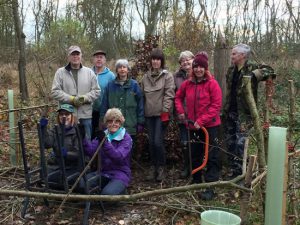 First up, let me share feedback from people who visit our woodland on a regular basis, whether involved in helping to look after it or in supporting others to experience connection with the woodland environment, reconnecting them to nature.
First up, let me share feedback from people who visit our woodland on a regular basis, whether involved in helping to look after it or in supporting others to experience connection with the woodland environment, reconnecting them to nature.
We have run weekly sessions for three years now which attract mainly, but not all, adults of retirement ago who benefit their wellbeing through learning to care for the woodland, which in turn actually cares for them.
The format of our nature reconnection sessions is very much about working as a team on light woodland management tasks It’s actually the process of doing the work that is more important than the amount of woodland management completed, with emphasis on taking time while working to take notice and take time to connect with the surroundings.
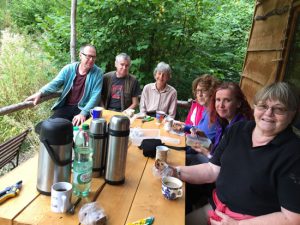 There is also part of each woodland wellbeing session dedicated to being social over some light refreshments, generating much in the way of smiles and laughter through the interactions.
There is also part of each woodland wellbeing session dedicated to being social over some light refreshments, generating much in the way of smiles and laughter through the interactions.
Below is some of the feedback we’ve received about the benefits gained from regular time spent connecting with nature in our woodland. All those interviewed had attended sessions for at least three months, with others coming along for over 18 months.
During our sessions I don’t talk about wellbeing benefits particularly, but the responses from attendees when asked what they felt was the main benefit of coming along was uniformly about perceived improvements to their own wellbeing. Ours may be a small sample of people to draw from, but the inference is clear in relation to the wider society.
- “Calming and energizing, helping put some aspects of life into perspective”
- “Definitely has a therapeutic effect, recharging the batteries”
- “Makes me feel more alive, ready to face the week ahead”
- “Helps me sleep better at night”
- ‘Working outside with people in a general relaxed atmosphere is stressless’
The science underpinning nature connection benefits
Spending time connecting with nature, whether or not in a woodland setting, is becoming more widely accepted by the medical profession as a way to combat stress, as an alternative to prescription drugs. You can read more about why doctors are prescribing walks in tree filled places, whether forest or woodland.
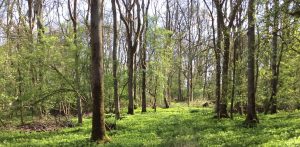 In Japan, the practice of Shinrinyoku (forest bathing) became part of their national public health service in 1982. Encouraging the population to spend time among trees has been scientifically proven to lower blood pressure, slow heart rates, reduce stress hormone production, boost the immune system and improve general feelings of wellbeing.
In Japan, the practice of Shinrinyoku (forest bathing) became part of their national public health service in 1982. Encouraging the population to spend time among trees has been scientifically proven to lower blood pressure, slow heart rates, reduce stress hormone production, boost the immune system and improve general feelings of wellbeing.
Research studies by O’Brien (in 2004 and 2005) concluded that the outcome of spending time in woodland results in stress reduction and mental and emotional wellbeing benefits. There is a growing body is scientific evidence that supports the proposition that trees can make us feel better and that woodland provide valuable therapeutic landscapes.
A student from Northampton University undertook a research study at our woodland, interviewing our group of retirement age volunteers. You can read more about the study by following this link “Outdoor eco-therapy in practice”,
Plug into nature to feel an energy flow
I want to feature the experiences of two unrelated people on how connection with nature can benefit health and wellbeing. I have met several woodland owners online who have kindly shared their experiences of woodland ownership and the joy it brings them, but also valuable insight into how and why woodlands in particular can deliver benefits to human health and wellbeing.
First up, Steve (known online as the Happy Cabby) and Tamara who own a block of around 5 acres on the edge of Dartmoor National Park. 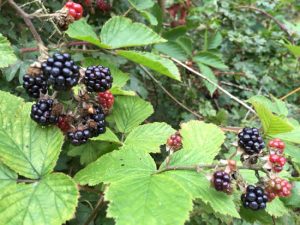 “I have had a passion for wildlife and the environment from an early age, if I was to have my time again I would have definitely chosen a career path directly related to my interests in the natural world. We have just started phase 1 of planting out a bank with native species such as Dogwood, Dog Rose, Hawthorn, Blackthorn, Field Maple, Oak etc. Future plans include habitat management and provision for The Greater Horseshoe Bat and another is to dig a pond area that will add a valuable element to the site’s biodiversity. Other plans include wildflower meadow areas and fruit orchard . All these ideas will take years and a lot of hard work clearing the appropriate sites but long term our aim is that our little patch will be a haven of wildlife with many additional species visiting and inhabiting”.
“I have had a passion for wildlife and the environment from an early age, if I was to have my time again I would have definitely chosen a career path directly related to my interests in the natural world. We have just started phase 1 of planting out a bank with native species such as Dogwood, Dog Rose, Hawthorn, Blackthorn, Field Maple, Oak etc. Future plans include habitat management and provision for The Greater Horseshoe Bat and another is to dig a pond area that will add a valuable element to the site’s biodiversity. Other plans include wildflower meadow areas and fruit orchard . All these ideas will take years and a lot of hard work clearing the appropriate sites but long term our aim is that our little patch will be a haven of wildlife with many additional species visiting and inhabiting”.
I don’t know about you, but I could not only feel Steve’s passion shining through his account of plans for work in his woodland. but his words held a power to enthuse me to want to get involved in something similar too, because I could visualise a plan, a course of action to occupy both body and mind; in itself a path to relaxation and stress relief.
Second up are words from another online contact David Ward which I think provide great insight into how woodlands and wellbeing are inextricably linked.
“Observing nature makes me feel relaxed and revitalised. Sitting quietly, watching wildlife focusses my attention on those energy giving resources and away from my own worrying thoughts.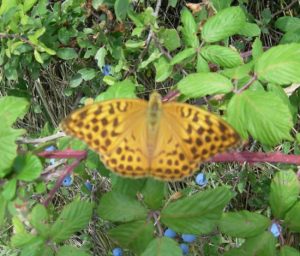
Mindfulness is a bit of a buzzword now taken up by many trendy, alternative health practitioners but you can read as many books or listen to seminars on it but that will not bring you to the state of it. I have dabbled with meditation and found traditional methods of clearing the mind do not work for me. I do find that walking through woodlands and sitting quietly and engaging my senses with the environment, works incredibly well. The association with that good feeling of being in woodlands, now acts instantly the moment I step into them. It’s like plugging into nature and having its energy run through me. I believe there are genetic factors in our psyche that go back to our Neolithic ancestors that still resonate in us when in a natural environment.”
Nature prescriptions
Whether your belief as to whether connecting with nature makes people happier and healthier is influenced by scientific studies or by anecdotal reporting, there seems little doubt that nature connection can deliver health and wellbeing benefits.
In what’s believed to be the first programme of its kind in the UK, Doctors in Shetland, Scotland can now give nature prescriptions to their patients. with the aim of reducing anxiety and blood pressure, and benefits for those suffering from stress, heart disease and depression.
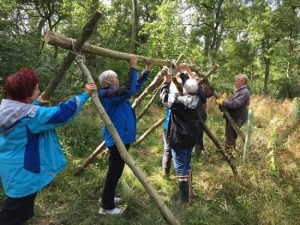 If nature connection can potentially do so much for individuals then surely regular doses of nature connection, as an alternative to drug prescriptions, should be promoted by the medical profession more widely?
If nature connection can potentially do so much for individuals then surely regular doses of nature connection, as an alternative to drug prescriptions, should be promoted by the medical profession more widely?
Society as a whole could benefit from being guided on how to reconnect with nature. Humans possess an innate and deeply rooted skill-set which may have become buried under layers of 21st century living, but certainly is not lost altogether.
Hands up who’d like to take part in some nature reconnection to benefit their health and wellbeing?
Other posts and pages that may be of interest
Attending a woodland working party is a great way to start the week
Here you can create the content that will be used within the module.

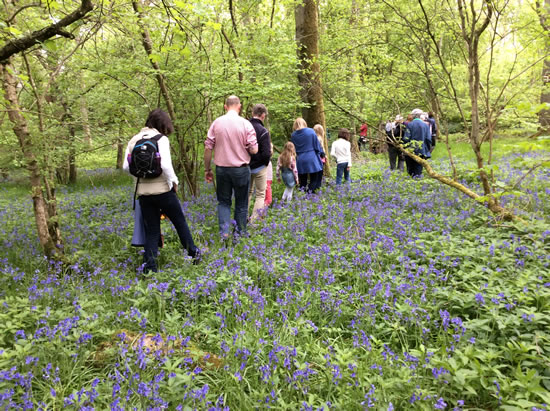
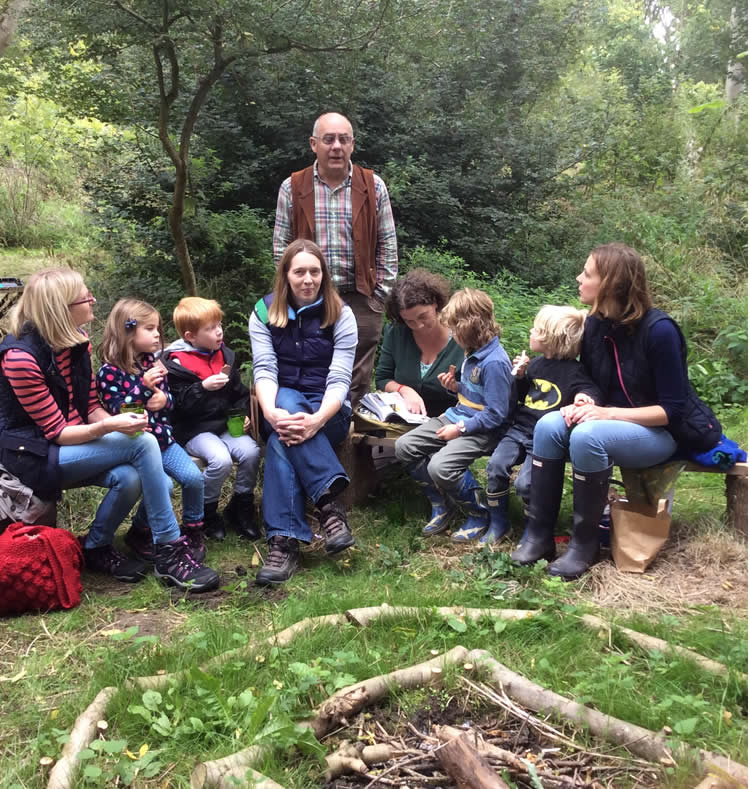
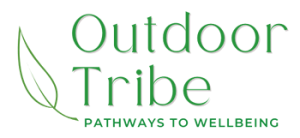
Recent Comments